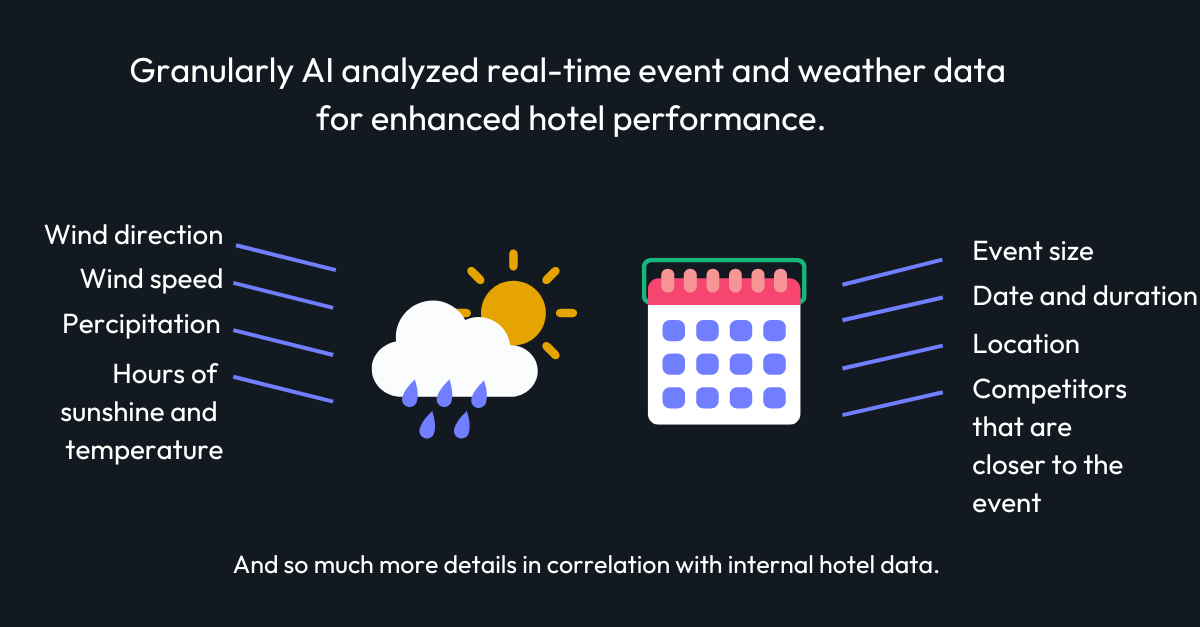Weather Data 🌦️
By analyzing real-time weather data, ARIS predicts fluctuations in demand and accordingly adjusts pricing and marketing strategies. For example, let's assume we have a hotel near the Baltic Sea. Some regions here are known for kite- and windsurfing. In this specific example, it is particularly interesting to know how the wind behaves, because diagonal onshore wind is best suited for these kinds of activities. This means that when the wind conditions change to this specific direction just two days before the weekend, a hotel in this region will potentially get a short-notice pick-up. For hotels in the alpine area, the snowfall and the temperature or the hours of sunshine might be of importance, to receive reservations. However, a hotel subject to specific weather conditions no longer has to worry about it since ARIS recognizes these factors and their impact automatically and uses the insights for setting prices.
Event Data 🎉
Every revenue manager knows that events, such as conferences, concerts, sports events, and festivals, can influence hotel occupancy and pricing. However, not all events are the same, each event can have a different impact. It depends on multiple factors not only the size of the event, but also the location plays a role. For example, how many competitors are closer to the location, and at what price do they sell? Keeping track of all this information is impossible even for a large revenue team. ARIS, on the other hand, knows all the events in your city and analyzes all these factors, learns from the booking behaviour of old events, the current pace, etc. and thus determines the event-specific relevance for each hotel anew.

Vacation Data respectively Holiday density 🏖️
Seasonal fluctuations, school holidays, and international vacation periods all affect travel patterns. By analyzing vacation data, hotels can forecast peak periods and strategically plan marketing campaigns during times of low demand. ARIS, the advanced AI system, utilizes historical and real-time booking data to identify the hotel’s target group and understand relevant vacations in specific regions that influence hotel occupancy rates. With this information, ARIS calculates a unique Hotel Vacation Density for each property, providing a clear prediction of when and how many people from the target area will be free to travel throughout the year.
For instance, let's consider we still have the hotel located on the Baltic Sea. While one might assume that vacations in Nordic states would primarily influence its occupancy, ARIS helps identify emerging trends that might otherwise be overlooked. For example, it could reveal that the Bavarian summer vacation period is also increasingly attracting leisure travellers. This AI-driven insight prevents missed opportunities and ensures the hotel can maximize its potential. Leveraging Hotellistat's holiday density feature can further minimize opportunity costs and enhance strategic decision-making.
Conclusion
The previous examples only scratch the surface of the myriad opportunities available to use this data to shape hotel pricing decisions. With ARIS' ability to predict weather-related demand fluctuations, analyze event relevance, and identify peak vacation periods, hotels can make smarter decisions to maximize revenue and stay ahead of their competitors. In the next volume, you can read more about how ARIS comes to its insights and about the system's ability to set hotel prices automatically and optimally in a matter of seconds, without any manual assistance required.

